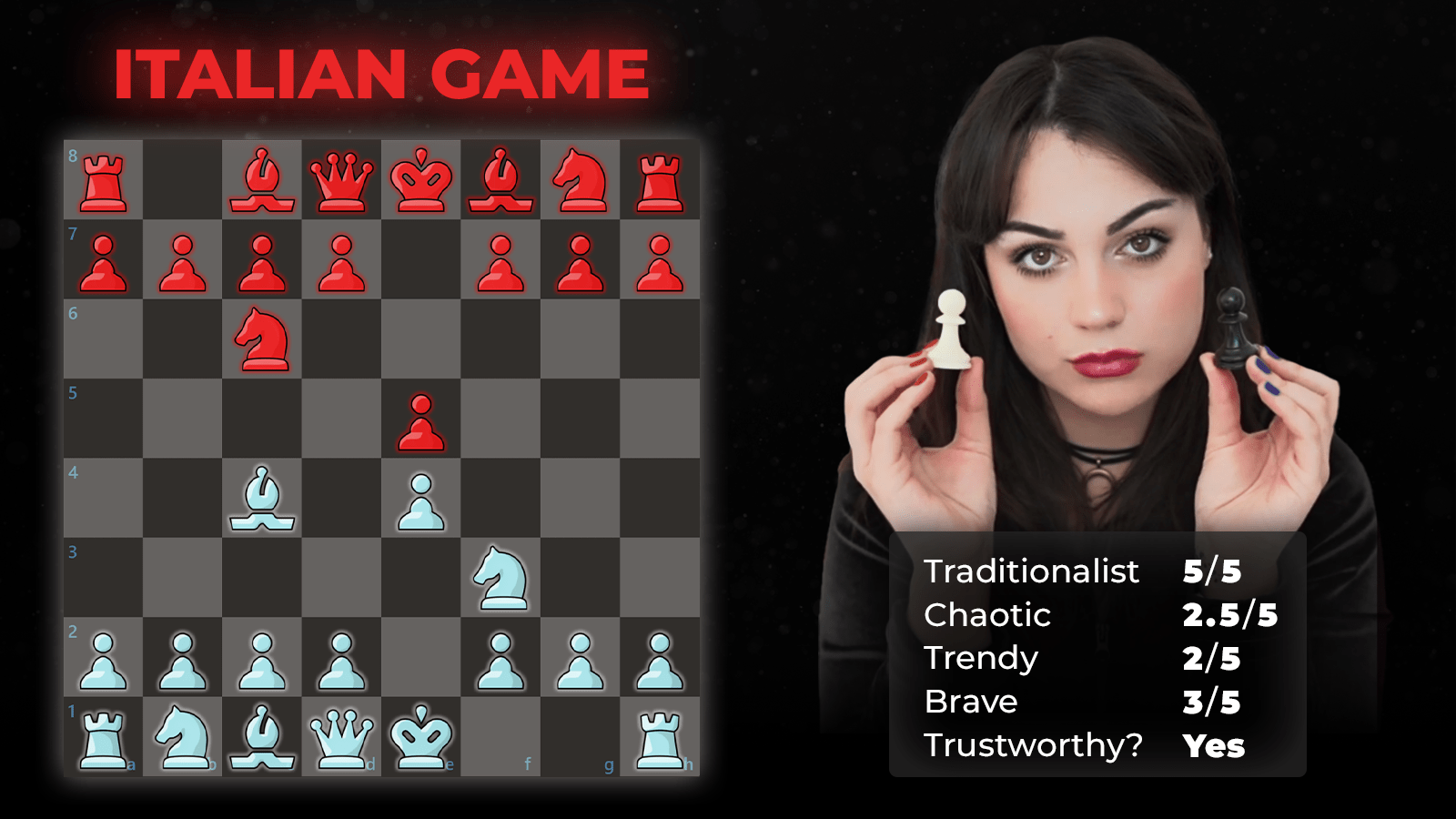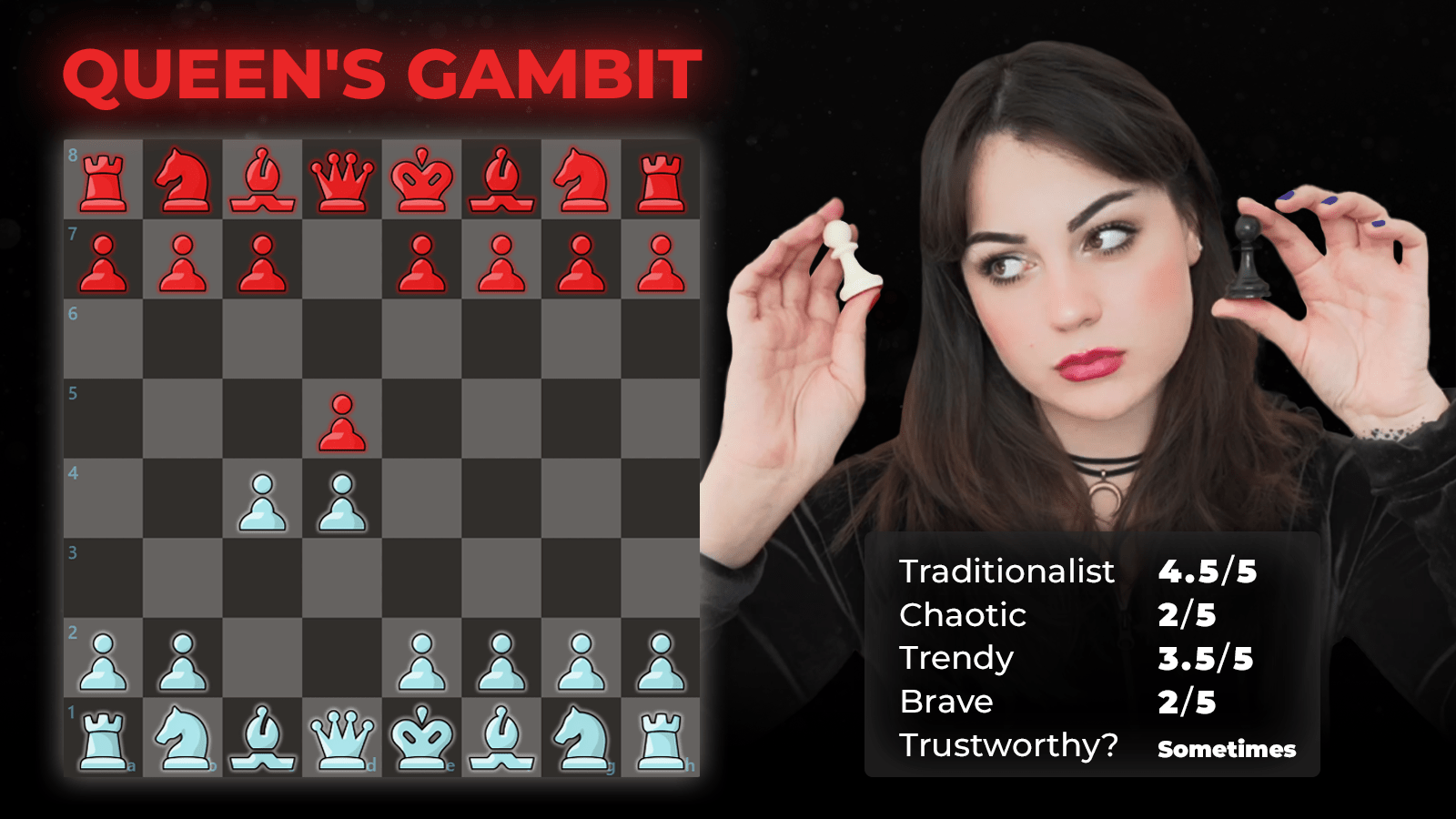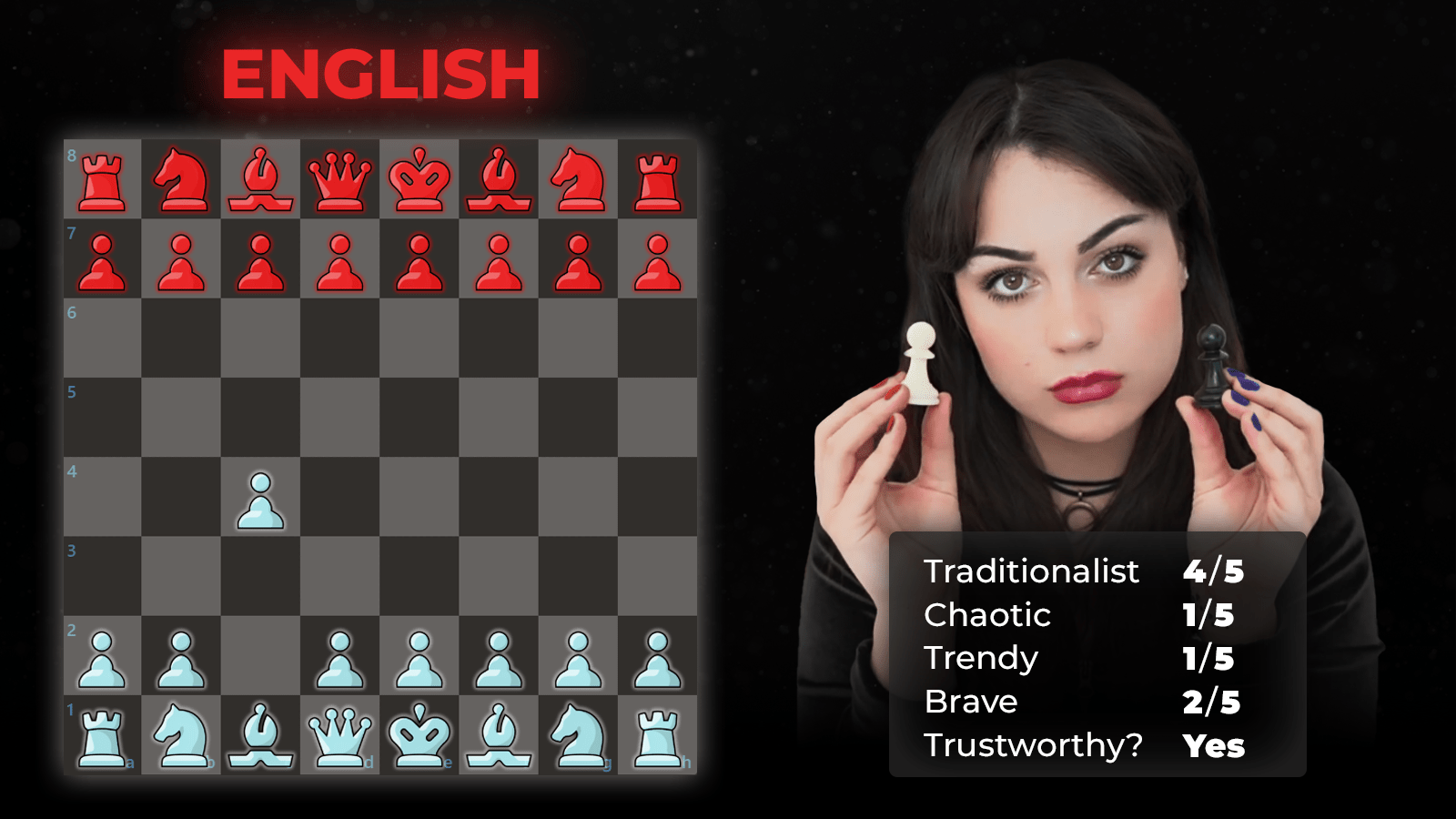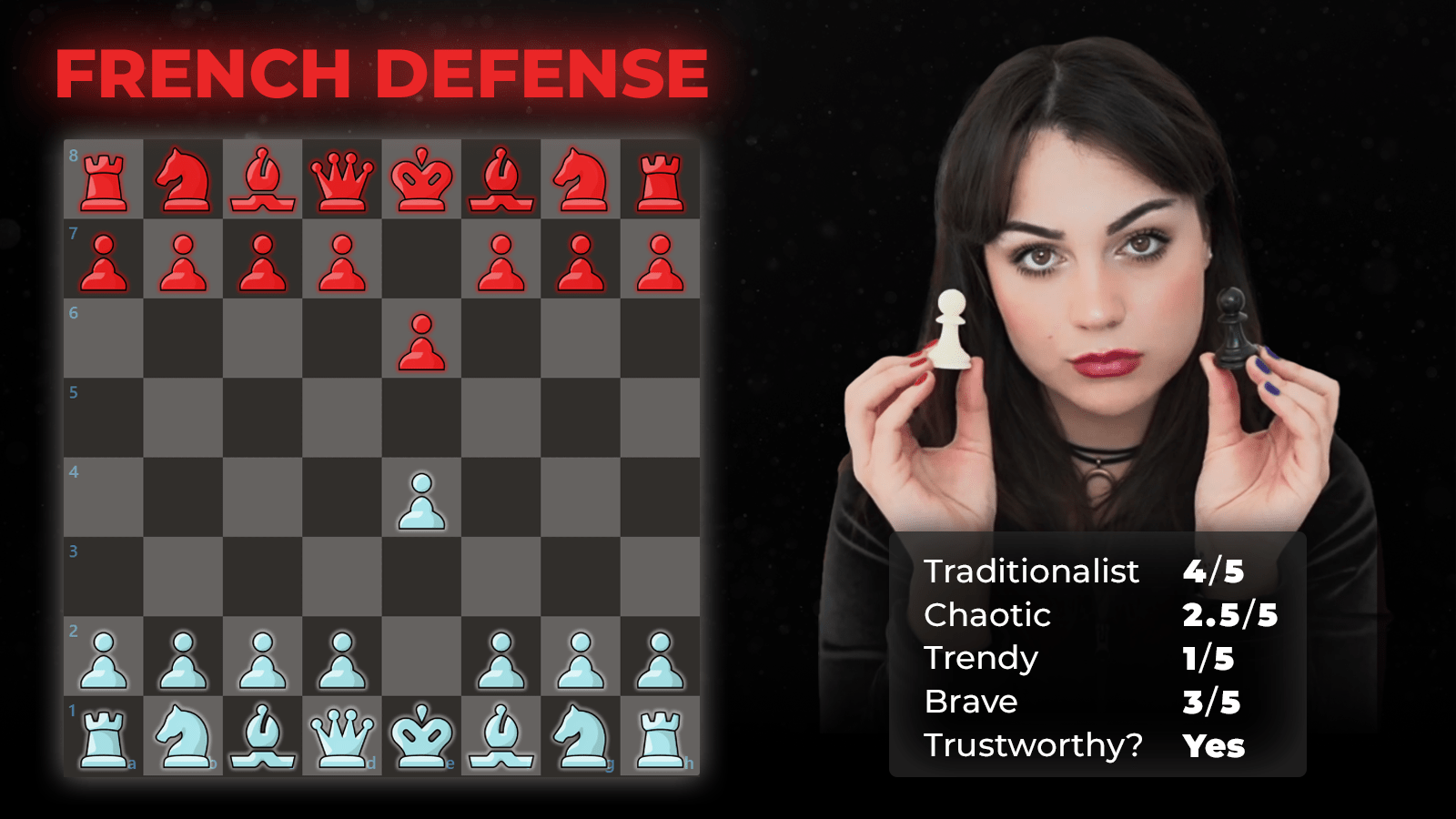
What Your Favorite Chess Opening Says About You
Openings are always a point of discussion (and often a point of contention) for chess players of all ratings. Are you tactical or positional? Do you prefer open positions or closed positions? Knights or bishops? Long castle or short castle? There is a plethora of questions chess players ask each other when trying to figure out the playing style of their peers.
In fact, knowing the favored opening of another player sheds light on their strengths and weaknesses, their personalities, and their tendencies both on and off the board. So, what does your favorite chess opening say about you?
Table of Contents
Italian Game
The Italian Game takes many forms, but the e4 player who favors the Italian is a traditionalist at heart. The kinkiest among them favor the Fried Liver, while theory skeptics simply like it because "it's principled... you know, control the center, knights then bishops!" Being one of the oldest openings, it's no surprise that players who favor the Italian Game are true chess enthusiasts who love the opening for its classical ideas, naturally developing play, and historical significance.

You may wonder why I haven't mentioned the Evans Gambit, an aggressive weapon and the choice opening of none other than chess content creator Agadmator. As someone who, at times, pushes the b-pawn even on move one, I can't criticize succumbing to the intrusive thought of pushing a flank pawn. Evans Gambit players are the quirkier cousins of Italian Game players; they are less predictable, more outgoing, and naturally more likely to take risks. No stranger to a little chaos, they're definitely fun at parties.
Stats:
- Traditionalist 5/5
- Chaotic 2.5/5
- Trendy 2/5
- Brave 3/5
- Trustworthy? Yes
Queen's Gambit
Queen's Gambit players often take themselves very seriously. Having "graduated" from king's pawn openings, they're looking for something a little more mature... or so they think. Queen's Gambit players are often more than a little self-conscious and are ready at any moment to remind you that they "don't play the London System, though."

Purposefully avoiding the Sicilian Defense and sharp 1.e4 e5 open games, Queen's Gambit enjoyers revel in the positional nature of their opening of choice and patiently wait for the tactics to come to them rather than chasing them out of the opening. They roll their eyes at the Benko Gambit and the Benoni Defense, while quietly wishing that everybody would just play the Queen's Gambit Declined. These players definitely want you to think they know what they're doing when in reality they're winging it just like the rest of us.
Stats:
- Traditionalist 4.5/5
- Chaotic 2/5
- Trendy 3.5/5
- Brave 2/5
- Trustworthy? Sometimes
Ruy Lopez
I'm a recent Ruy Lopez convert, so I may be a little biased, but the Spanish gets a lot of unnecessary bad press for being "boring." It's true—at the highest level we see too many Berlin draws, and the Ruy has a reputation for being complicated, but as one of the oldest chess openings it is accessible to all and played at every level.
I must tell you, there are two types of Ruy Lopez players: those who go into the Exchange and those who do not. They may seem like two sides of the same coin, but they are fundamentally different. Neither is boring, but I leave you to form your own judgment about players who so readily give up the beloved bishop pair. Spanish players favor complexities both over the board and in life and are natural deep thinkers and problem-solvers.

Because the Ruy Lopez is such a complex opening, it's no surprise that its lovers also enjoy challenges, riddles, and puzzles of all kinds, and most of all want to know why things work the way they do. They are naturally ambitious and very communicative, but not always the most sensitive.
Stats:
- Traditionalist 5/5
- Chaotic 2/5
- Trendy 3.5/5
- Brave 4/5
- Trustworthy? No
Sicilian Defense
Sicilian Defense players are the natural showmen of the chess world. They win you over with their charm and are ambitious to a fault. Perhaps you won't be surprised to hear that they often bite off more than they can chew! Bigger dreams were never had than by those who push 1...c5!, and the Romantic idea of winning a game that even Stockfish 15 would swoon over provides motivation for players who, like the rest of us, play more blunders than brilliancies.
people play the Sicilian defense for attention
— lula (@lularobs) October 20, 2022
To be truly successful as a Sicilian player requires a level of self-discipline and self-control not often found in those who are as optimistic as a 1. e4 c5 player when down a rook and two pawns in exchange for "the initiative!"

Their childlike optimism is endearing but often wears away through the years as the player who initially thought the Accelerated Dragon "sounded like a cool opening" becomes more mature, more patient, and actually learns the theory. Those Sicilian players? They're kind of scary.
Stats:
- Traditionalist 3/5
- Chaotic 5/5
- Trendy 4/5
- Brave 5/5
- Trustworthy? No
Catalan
I don't know a single person who actually enjoys playing against the Catalan Opening. That being said, it's a complicated opening from both sides, and Queen's Gambit players who fancy themselves ready for that kingside fianchetto often jump in too soon. The true Catalan player is someone we all look up to, a person wise enough to understand the positional nuances of the opening, but sharp and quick-witted enough to keep you on your toes both in the game of chess and in real life. Authentic Catalan players are hard to find, and you can find many who purport to be one without knowing where the Queen's Gambit ends and the Catalan begins.

It may surprise you to hear that Catalan players are actually quite concerned with self-image. Knowing that so many others envy their nuanced understanding of positional chess and patient, mature outlook, they are deeply concerned with how they are perceived by others. The Catalan player is a perfectionist and a little bit of a control freak at times, but they always mean to do their best.
Stats:
- Traditionalist 2/5
- Chaotic 2/5
- Trendy 4/5
- Brave 2/5
- Trustworthy? Yes
Caro-Kann Defense
GM Bent Larsen would never believe you if you told him that the Caro-Kann Defense has become a Gen Z favorite thanks to GothamChess. Quoted as saying, "If you play the Caro-Kann when you are young, then what would you play when you are old?" Larsen's take on the Caro being a boring response to 1.e4 doesn't seem to be shared by post-PogChamps chess beginners. In fact, it's the opening I started out playing.

However trendy it may have become, I can't deny that the Caro is an opening for solid, sturdy, and maybe slightly shy players who "just want to equalize!" and aren't looking for a bloodbath over the board. The meeker among them quake at the thought of the "Fantasy Variation," "Bayonet Attack," or "Tal Variation." White gets a lot of play, and Black... defends. But any good Caro player always has a verbal refutation even if they lack one on the 64 squares; they are always ready to remind you that at the very least, they "don't have the French bishop!"
Stats:
- Traditionalist 4/5
- Chaotic 1/5
- Trendy 4/5
- Brave 1.5/5
- Trustworthy? No
English
A grandmaster who will remain unnamed once told me that nobody under 2000 Elo should play the English Opening. This, however, didn't stop 1400 me from giving it a shot. In an ideal world, English players have mastered both 1.e4 and 1.d4 and are the chameleons of the chessboard. Perhaps you think they are boring players, but are you the one voluntarily going into the Symmetrical Variation?

Highly transpositional openings attract multidimensional personalities—chess players who can fit into any social setting and find common ground with any type of person. Like Taylor Swift says, "I'm a mirrorball / I'll show you every version of myself tonight." Flirting with the idea of being a flank opening, without the character weaknesses of the Polish or the Grob, the English is incredibly well-respected. Played by uber-serious super-GMs like Anatoly Karpov, English players may seem standoffish or unapproachable, but I promise you, it's just a mask.
Stats:
- Traditionalist 4/5
- Chaotic 1/5
- Trendy 1/5
- Brave 2/5
- Trustworthy? Yes
King's Indian Defense
King's Indian Defense players truly have no chill. They are no strangers to going "goblin mode," and instead of fearing judgment, they make a point of subverting societal expectations. Anyone who is so willing to hinge their entire existence on the vague idea of pushing the f-pawn must be regarded with some level of respect, even if seeing them scramble through a blitz game feels like watching a chimp solve a puzzle at the zoo.

Of course, if you actually let them get their teeth into something, the KID player is a force to be reckoned with. Volatile and a little bit unhinged, they are the life of the party... but can often take things a bit too far. Fierce idealists, they are obsessive in their singularity and are as wedded to their favorite opening as a penguin would be to its favorite rock.
Stats:
- Traditionalist 3/5
- Chaotic 5/5
- Trendy 3/5
- Brave 5/5
- Trustworthy? No
London System
So many disparaging comments get thrown around about the London System that you begin to wonder if its proponents actually enjoy being mocked. I'm guilty of having made a few memes about it myself, but ever since Ding beat Nepo in game 6 of the 2023 World Chess Championship match with none other than the London, we all have to review our stance on this opening.
Popularized online by IM Levy Rozman and Andrea Botez, the London is marketed to beginners for its accessibility, the same thing that makes it an easy target for those who seem to pride themselves on playing "harder" or "more complex" openings. London System players are kind and a little bit naive. They aren't quite sure why we're being mean to them, or why we have to cast value judgments on which pawn we move first in the opening. At the same time, you wonder if these are the same adults who still ask the bowling alley to keep the side bumpers up, just to make things easier.

These are people not yet ready to leave their comfort zone, and even the idea of the Jobava London is exotic to them. One day they'll realize that everyone has to leave home eventually in order to grow, but for now, they are too busy pre-moving their opening to consider such matters, and that's fine.
Cleansing my computer after my opponent played the London System 🙏🏻 #chess pic.twitter.com/CDRXwAGQu3
— lula (@lularobs) June 13, 2022
Stats:
- Traditionalist 3/5
- Chaotic 0/5
- Trendy 3/5
- Brave 1/5
- Trustworthy? Definitely not
French Defense
The French Defense is mocked almost as much as the London System, but unlike the London, the masochistic tendencies of those who play this opening are complemented by an equal desire for chaos. Why else would anybody choose to play an opening that so frequently warrants GM Ben Finegold's least-favorite move, ...f6?
The French does often come with a problem piece... the light-squared bishop, but there is something endearing about French players accepting this and saying, "I'm good enough to win with this anyway." Having moved to the French after starting with the Caro-Kann, I used to be one of those players who mocked the "bad bishop." All I can say now is sorry, and I was wrong.

A lot of the disrespect about the French Defense comes from those who are all too ready to mock the Exchange Variation, which they seem to forget is actually an opening chosen by White. It should be noted that both Winawer Variation and McCutcheon Variation players regard life with such reckless abandon that is mirrored by only those who play either 1...e5 or the Sicilian Defense. Rubinstein Variation and Classical Variation players are entirely different, favoring safety and stability and just looking for a solid response to 1.e4. In fact, put two French defense players next to one another and you may not think they are similar at all.
Stats:
- Traditionalist 4/5
- Chaotic 2.5/5
- Trendy 1/5
- Brave 3/5
- Trustworthy? Yes
As you can see, personality and preferred openings go hand in hand, and there can be a lot of trial and error in finding the right fit. Extroverted, outgoing people may feel suffocated in the Caro-Kann, while shy, quiet players may find the thought of the Open Sicilian entirely terrifying. Of course, master-level players switch between openings with ease; it's like seeing a model changing outfits on the runway and wondering, "How do they somehow look good in everything?"
“I play the Sicilian” 🥴 #chess pic.twitter.com/PB0z4V50By
— lula (@lularobs) November 4, 2022
But even GMs have their preferences, and clicking with an opening that fits you perfectly is oh-so rewarding. So, what does your favorite opening say about you? Let us know in the comments below.
If you liked this article, check out Lularobs on Twitch and discover what your favorite board theme and piece set say about you!






